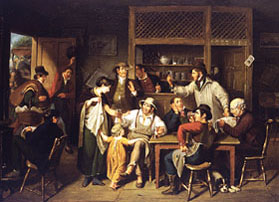BEYOND THE FOUNDERS:
|
|
Edited by Jeffrey L. Pasley, Andrew W.
Robertson,
|
|
|
|
|
Still
Available from University of North Carolina Press
|
|
|
|
|
TABLE OF CONTENTS |
|
| Introduction: "Beyond the Founders" | David
Waldstreicher Jeffrey L. Pasley Andrew W. Robertson |
|
PART ONE: Democracy and Other Practices |
|
| 1. "The Cheese and the Words: Popular Political Culture and Participatory Democracy in the Early American Republic" | Jeffrey L. Pasley University of Missouri |
| 2. "Voting Rites Acts: Electioneering Ritual, 1790-1820" | Andrew W. Robertson CUNY Graduate Center Lehman College Colgate University |
| 3. "Why Thomas Jefferson And African Americans Wore Their Politics On Their Sleeves: Dress And Mobilization Between American Revolutions" |
David Waldstreicher Temple University |
|
PART TWO: Gender, Race, and Other Identities |
|
| 4. "Women and Party Conflict in the Early Republic" | Rosemarie Zagarri George Mason University |
| 5. "The 'Little Emperor': Aaron Burr, Dandyism and the Treason Trial of 1807" | Nancy Isenberg University of Tulsa |
| 6. "Young Federalists, Masculinity, and Partisanship during the War of 1812" |
Albrecht Koschnik Florida State University |
| 7. "Protest in Black and White: The Formation and Transformation of an African American Political Community During the Early Republic" | Richard Newman Rochester Institute of Technology |
|
PART THREE: Norms and Forms |
|
| 8. "Consent, Civil Society, and the Public Sphere in the Age Of Revolution and the Early American Republic" | John L. Brooke Ohio State University |
| 9. "Beyond the Myth of Consensus: The Struggle to Define the Right to Bear Arms in the Early Republic" | Saul Cornell Ohio State University |
| 10. "The Federalists' Transatlantic Cultural Offensive of 1798 and the Moderation of American Democratic Discourse " | Seth Cotlar Willamette University |
|
PART FOUR: Interests, Spaces, and Other Structures |
|
| 11. "Continental Politics: Liberalism, Nationalism, and the Appeal of Texas in the 1820s" | Andrew R.L. Cayton Miami University (Ohio) |
| 12. "Private Enterprise, Public Good? Communications Deregulation as a National Political Issue, 1839-1851" | Richard R. John University of Illinois at Chicago |
| 13. "Popular Movements and Party Rule: The New York Anti-Rent Wars and the Jacksonian Political Order" | Reeve Huston Duke University |
| 14. Commentary: "Déjà Vu All Over Again: Is There a New New Political History?" | William G. Shade Lehigh University |
|
|
|
Back to the Early American Republic Plugged-In |
|
